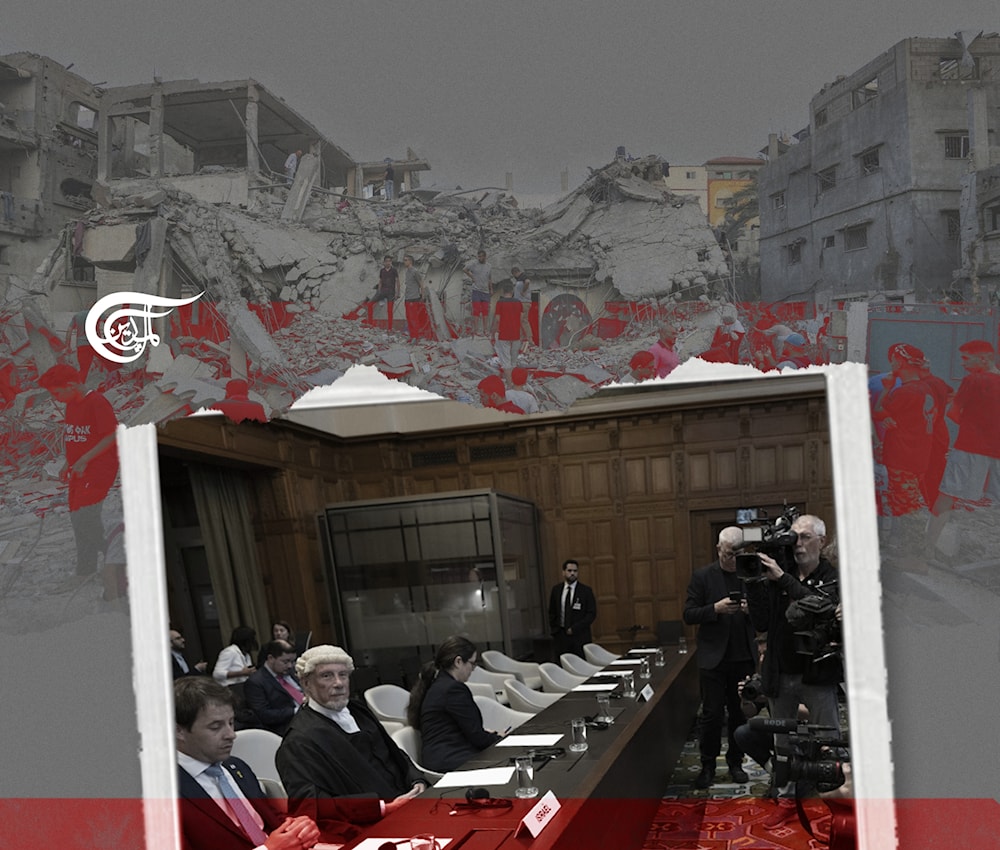The Israeli regime is in legal trouble, but what does this actually mean?
When the Palestinian Resistance finally broke down the gates of their concentration camp on October 7, all previous understandings were torn to shreds.
-

It is inevitable that when people are subjected to apartheid rule, they will revolt and resist (Illustrated by Mahdi Rteil to Al Mayadeen English)
Within the space of one week, the Israeli regime was hit with two major legal blows, first from the International Criminal Court (ICC) and then from the International Court of Justice (ICJ). While these measures may not actually translate to any tangible changes on the ground for now, the chronic effects may prove irreversible.
Prior to the launch of Operation Al-Aqsa Flood by the armed wing of Hamas, the al-Qassam Brigades, the political predicament of the Palestinian cause was that it remained on life support. Although the majority of United Nations member states would annually vote on the so-called Two-State solution model on bringing about a resolution to the conflict, there were no real efforts to translate this unanimous consensus into a reality on the ground.
It was interpreted throughout most of the world, including in the United States and the Zionist entity, that the Palestinian question was effectively stuck and was not even worthy of attention. Therefore, the US government pursued normalization deals with the Arab regimes and believed that Israeli efforts to Judaize the holy sites in occupied al-Quds and the Naqab, as well as to annex areas in the West Bank, were not going to impede their mission to reach a prized Saudi-Israeli deal.
Meanwhile, the situation on the ground for Palestinians grew even more dire. While in the past there were certain political limits as to how far internationally renowned Human Rights groups could go in their criticisms of Israeli policy and practices against the Palestinians, this somewhat eased as there was not even talk of any developments in favor of Palestinians politically. Therefore, we saw the likes of Human Rights Watch (HRW), Amnesty International, and the top Israeli human rights group, B’Tselem, release reports justifying why they identified "Israel" as an apartheid regime.
It is telling that these human rights reports, which in the cases of HRW and Amnesty were voluminous and provided copious sources, were able to essentially affirm what Palestinian human rights groups had been saying for decades. What was most significant about these reports, however, is that they did not stop at condemning Israeli conduct in the West Bank, Gaza, and the eastern part of al-Quds, but chose to shine a light on the entirety of occupied Palestine.
Despite the condemnations by Israeli leaders, who predictably labeled the reports "antisemitic", it became clear that these were not deemed as consequential to the point of triggering any form of change in policy. Yet, this is where it all started to go terribly wrong for the Zionist entity.
In this post-October 7 setting, we are now living in a world where the Palestinian cause is not only internationally relevant, it is the most popular issue of its time. The entire world is fixated on the Palestinian struggle and the ongoing atrocities in Gaza, and millions of people are consistently taking any action they can to support the Palestinian cause for national liberation. This is all happening without there even being a unified Palestinian leadership.
It is in this context that the International Court of Justice (ICJ), ruled in favor of South Africa’s submission accusing the Israelis of violating the Genocide Convention. The ICJ voted unanimously to impose provisional measures on the Zionist regime to prevent genocide in Gaza. This may not have actually stopped the war in Gaza, but the effects of the Israeli regime being plausibly accused of committing genocide in the top legal authority on earth will remain now forever.
The reason why the accusation of genocide against the self-proclaimed “Jewish State” is so damning, is because the entire Israeli invention narrative surrounds the idea that the reason why they have a right to exist as a state is because they were themselves subjected to a genocide. So, if “Israel” is seen to be a regime that conducts genocide, it cannot on the other hand use the excuse they need to exist because of genocide.
On Friday, the ICJ accepted the South African submission requesting further provisional measures be adopted by the court, asserting that "Israel must immediately halt its military offensive, and any other action in the Rafah Governorate, which may inflict on the Palestinian group in Gaza conditions of life that could bring about its physical destruction in whole or in part." What it also did was specifically deem it necessary to “reaffirm” that the Israelis must abide by the initial provisional measures ordered by the court. If the Zionist entity directly chooses to violate the ICJ’s orders, which are considered binding by the United Nations, it could trigger further action against it and work against its favor in the ongoing genocide case.
In addition to this, the decision by the International Criminal Court (ICC)’s chief prosecutor, Karim Khan, to finally request arrest warrants for Israeli Prime Minister Benjamin Netanyahu and his Defence Minister Yoav Gallant now also piles on even more pressure.
The way this now looks for the Zionist entity is as follows; they are a genocidal, apartheid regime that is committing crimes against humanity and are run by wanted war criminals. This is the case, as more and more nations around the world continue to recognize Palestine as a state and cut ties with the Israeli regime.
It is also apparent that this genocidal apartheid regime, run by war criminals, cannot possibly conclude any kind of deal to resolve the situation by allowing a so-called “Two-State solution”. There are no major political parties that could plausibly come to power after Netanyahu’s coalition that would accept the idea of creating a Palestinian State, nor is there any effort going on to create a viable roadmap to a peaceful solution.
For any objective observer the reality today couldn’t be any more obvious: “Israel” is an entity that is based upon total Jewish supremacy and will not allow a reality in which Palestinians can have human rights. If the Palestinian people, who are roughly equal to the size of the Jewish Israeli population in the entirety of historic Palestine, or what the Zionists would call “Greater Israel”, then the only way to maintain the Zionist regime in which only Jews are granted the right to self-determination, is either in maintaining an indefinite system of apartheid or choosing to conduct a mass campaign of ethnic cleansing or genocide.
It is inevitable that when people are subjected to apartheid rule, they will revolt and resist. Both the Israeli regime and its Western backers wanted this to be a status quo, to maintain apartheid and periodically allow the Zionists to mass murder the Palestinians in order to "put them in their place." Until October 7, the US-Israeli agenda was succeeding, although the Resistance in Gaza would go to war with the Zionists every few years, these armed flare-ups never inflicted a big enough wound on the Israelis to change the equation. This is why the Zionist entity would refer to its wars with Gaza as “mowing the lawn”, they believed it to be necessary and sadistically saw it as a calculated approach.
When the Palestinian Resistance finally broke down the gates of their concentration camp on October 7, all previous understandings were torn to shreds. The Zionist army, its intelligence agencies and weapons technology were dismantled and disgraced. Operation Al-Aqsa Flood shook them to their core, as neither the Israelis nor their American allies ever believed that such a defeat could be inflicted upon them. It is at this moment that they both decided that genocide would be the new goal and that apartheid could not work within the Gaza Strip. This is why the Zionists have no idea what to do in the besieged coastal territory, they evidently believed that after eight months they would have at least weakened the resistance in Gaza, but they even failed to do this and their deliberate annihilation of civilians and their homes has not led to victory.
Politically the Zionist entity is trapped, it understands there are limits imposed on what is possible for them to do in the Gaza Strip, such as the mass ethnic cleansing of the population into the Egyptian Sinai, so they are without a clue as to how they must proceed.
While the Zionist regime’s leadership tries to buy time and look for a way to achieve a victory, in order to at least save their political careers, they set the stage for future Israeli internal strife. All as the Lebanese Resistance lay waste to their military sites and settlements in the North, displacing over a hundred thousand settlers and debunking the idea that the Israeli military has the capacity to take on Hezbollah. The Israeli economy is being devastated, the Yemeni blockade in the Red Sea is incredibly effective and even the Iraqi Resistance are able to lob missiles and drones towards them at will, with no real response. On the battlefield in the Gaza Strip, their ill-trained occupation soldiers fight without discipline, returning to their families in body bags and with life-changing injuries, losing motivation by the day, due to fighting an endless battle with no goals.
The Zionist entity is now in real legal trouble, faces a legitimacy crisis, and only promises one thing to both the world and its own settler population, a future of war and battle for ethnic supremacy. Most of the world's population is looking on in utter horror at what they see occurring in Gaza, they are sick to their stomachs at what the Western regimes are backing and seek an immediate end to this disgusting racist regime's never-ending civilian massacre.
Although the ICJ and ICC decisions may seem meaningless in the short term, as did the flood of human rights groups labeling the Zionist Entity an apartheid regime, these are nails that will in due time be nailed into the Israeli coffin. The Israelis have sealed their fate, their apartheid regime is coming to an end, whether this is to occur quickly through a war of liberation or through a longer drawn out process.

 Robert Inlakesh
Robert Inlakesh
 10 Min Read
10 Min Read











